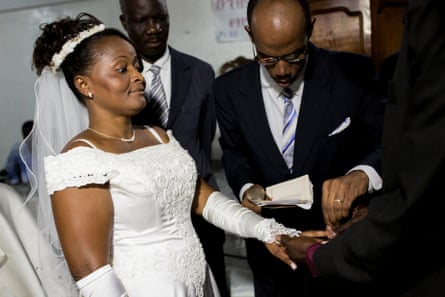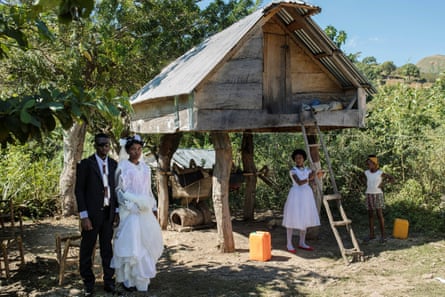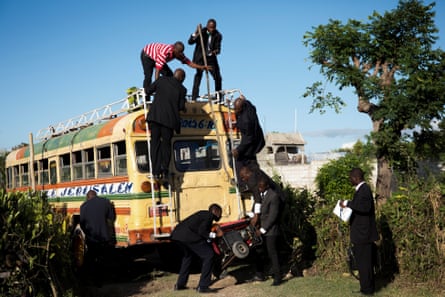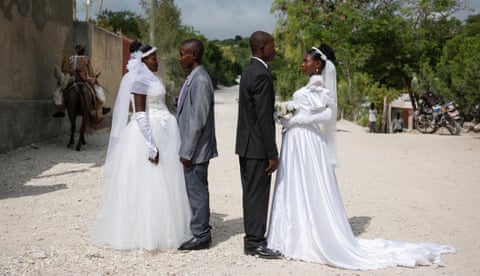As anti-government protesters in Haiti’s capital blocked principal roads and clashed with police last year, Stanley Joseph and Daphne Gerard used the city’s winding and potholed backstreets to make it to church for their wedding, decked out in all their finery.

A wedding announcer awaits a bride in Léogâne arrondissement
The bride wondered if they should postpone their big day when it became clear the majority of their guests would not make it, due to the violent unrest that had gripped Port-au-Prince for months. But they had spent a lot of money and time planning. Joseph, 36, felt they could make it work, although that meant chartering a plane to bring Gerard’s parents up from the south-east of the country.

Boys of honour Victor Rulx Guilbert, 25, Lucien Hasting, 27, Jean Louis Fabrice Guerlens, 25, and Edouard Wonder, 27, at Stanley and Daphne’s wedding, wear matching suits as part of Haitian marital tradition, as they wait for the ceremony to commence in Port-au-Prince

Stanley Joseph tries to remove the bride’s garter from underneath her dress, as their bridesmaids look on, during a wedding game in Port-au-Prince
Such is Haiti, where couples often have to surmount seemingly endless obstacles, from unrest and hurricanes to power outages and, above all, poverty, to get wed. But wed they do, and in style.
“We always have problems in Haiti. You can’t wait. You just have to get on and overcome them,” said Joseph, who wore a silver suit and lilac tie and boutonniere, matching the bridesmaids’ lilac dresses. “I was stressed but happy.”

Anelia Marcelus, 36, and Claudel Francois, 38, exchange rings during their wedding ceremony at Salem Evangelical Baptist church, Port-au-Prince Arrondissement
Marriage is not as widespread in Haiti as in other western countries, given the longstanding Creole tradition of plasaj, an informal marital relationship that is common in rural areas but not legally recognised. Yet, marriage has greater prestige and is particularly favoured by Haiti’s wealthier, cosmopolitan urbanites, according to Haitian sociologist Tamas Jean Pierre – not least because it is recognised abroad.
Left, Louimene Louis sits next to her cousin Midene Belantine, referred to in Creole as a queteuse, which is someone who helps the bride on her wedding day, before getting married in Bouli, Centre department. Right, Dalina poses for a photograph with her bridesmaid at a hair salon in Delmas, Port-au-Prince arrondissement
Protestant churchgoing communities also favour marriage, especially if a couple is expecting a child. Some religious schools will only accept pupils if their parents can provide a marriage certificate. “Often the reverend himself puts pressure on the couple, saying it is the will of God, which you cannot disobey,” said Haitian ethnologist Isaac Ducléon.

Vanessa Dorsainvil and Wesley Desir are surrounded by their godparents during a couple’s blessing at Shekinah Adventist church, during their wedding day in Port-au-Prince
Plasaj does not grant rights such as child support in the event of separation or a share of a partner’s estate if they die.
“I fell pregnant and, as we are both churchgoers, we decided to get married,” said Johanne Jean, 38, who wed one month after giving birth, nursing her baby throughout the day.
Johane Jean, 38, who works as a manager at a fast food restaurant, breastfeeds her one-month old son Jean Murat Darius, on the day of her wedding to Kilmite Darius, a mechanic, at a hotel paid for by Jean’s cousin, in Pétion Ville, Port-au-Prince
Still, in a country where more than half the population lives below the poverty line of $2.41 (£1.86) a day, only the wealthiest of Haitian couples can afford the full shebang of a wedding ceremony, lavish dinner reception and honeymoon. Most have to get creative.

Guests squabble by the buffet table as they help themselves to food at Favilson Pierre and Mauseline Greffin’s wedding in Carrefour.


Top left, a church friend irons a wedding guests’ dress, before a wedding in L’Asile. Top right, guests travel in a crowded car to a wedding reception in Liancourt, Artibonite. Above left, Joseph and Louimene Louis pose for a photograph in the courtyard of a family friend’s house before getting married in Bouli. Above right, guests load a generator onto a bus to be taken to a wedding in Liancourt
Sometimes multiple couples get married at the same time to save on church fees. They might skip the reception or, in the countryside, offer a simple meal of bread, fried plantain, rice and coffee. Sometimes, the whole village might provide food. Disputes can occur when there is not enough for all those who turn up, or when guests try to take home dishes or drinks.
Usually the cake is not big enough for everyone to have a piece so it is put on display during the wedding and consumed later at home. The couple may hire a pickup truck or motorbike taxis for the day to ferry people around. Or they may just walk to church, sweating up and down hills in their wedding clothes in the tropical heat.

Two pregnant couples, unknown to each other, marry in a joint ceremony to share the wedding in Baie-de-Henne, Nord Ouest department
Despite tight purse strings, the showiness of the ceremony is the one element a Haitian wedding never lacks. “It’s partly about expressing your social status,” said Jean Pierre. “Even the poorest women make an effort to have a beautiful wedding, which for them means a big eye-catching procession that people will talk about for a long time.”

Father of the bride Merilus Bonheur, who works as a forest ranger, leads his daughter Christela Bonheur, 29, and their relatives to church on the day of Christela’s wedding to Jocithe Auguste, in Forêt de Pins, Zone Mare Rouge
The bridal procession in church can include friends playing the part of a king and queen, while the bridesmaids and groomsmen often dress so similarly to the bride and groom that it can be difficult to define, from outside, who is getting wed. If a couple has relatives abroad willing to be the ‘godparents’ or witnesses, these will typically make a financial contribution to the wedding. This includes buying and shipping the bride’s dress, usually a bouffant white gown.

A pregnant bride and her groom travel by motorbike to their reception after getting married in a double wedding ceremony in Baie de Henne, Nord Ouest department
Reggae singer Mirla-Samuelle Pierre, 32, said her cousin who lives in New York and was her wedding godmother purchased her dress, shoes, gloves and tall sparkling crown. “I wanted to be different to everyone else so I got the tallest one there was,” said Pierre, who married her drummer and composer bandmate Duckyns St Eloi, better known as ‘Zikiki’.

Musician Duckyns St Eloi, who is known as ‘Zikiki’ sings to his bride Mirla-Samuelle Pierre as she enters the church with her father Pierre Obas on their wedding day at Église de l’Universite Adventiste d’Haiti, a church in Diquini, Carrefour. Right, Mirla-Samuelle Pierre puts on a tiara before her wedding

She wed in church, mainly to please her parents. But the theme of the wedding decoration was ‘rastafari,’ reflecting the culture of the dreadlocked groom. Zikiki, 38, wore a red, black, green and gold scarf over his white sui. He surprised his bride as she arrived in church by belting out the song What a Wonderful World. Like all but the wealthiest Haitians, they chose not to spend any money on a grand reception or honeymoon.
“Instead, that same evening we went out to a nightclub,” said Zikiki, “and we had a lot of fun together.”
Valérie Baeriswyl’s four-year project in Haiti has won the Yannis Behrakis photojournalism grant
